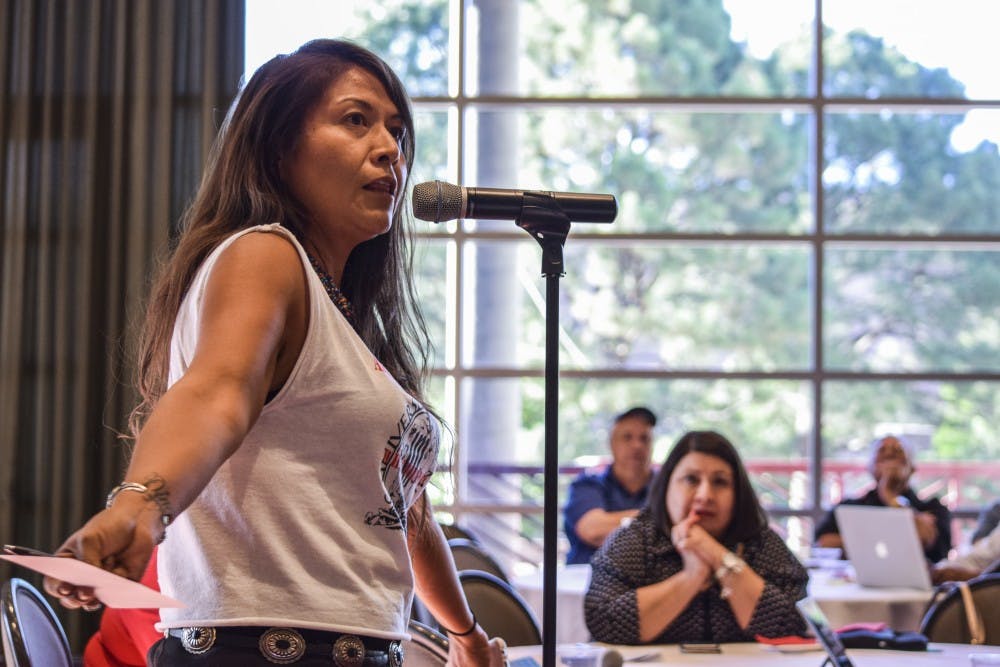The fight for racial justice by local Native American advocacy groups remains unsealed as UNM held a public forum over the controversial symbol.
The Office of Equity and Inclusion (OEI) held a forum to gather community input on whether the official UNM seal should be changed.
It is also gathering suggestions for a possible new seal design. The Office is assembling a report to give the Board of Regents in September.
Jozi De Leon, vice president of OEI, started by outlining the changes the official seal has already undergone, from an eagle design similar to the New Mexico seal to a heraldic design that first featured the conquistador and frontiersman.
De Leon said there have been complaints about the seal’s limited representation since 1991, but the Board of Regents has a history of reluctance when it comes to changing the seal’s design.
Tony Padilla delivered a letter that supports Kiva Club and the Red Nation’s eleven demands being met, which include abolishing the seal.
The letter had the signatures of over forty people and four organizations including Young Women United, Strong Families of New Mexico and Families United for Education.
Laura Harris, director of Americans for Indian Opportunities, said her relationship with the University has always been a fight.
“We had to fight for Native Studies to be a minor. We had to fight for Native Studies to be a major. We’re currently still fighting for a master’s,” she said.
Harris brought with her a letter signed by twenty-one indigenous leaders also in support of changing the UNM seal.
Rachel Levitt, a doctoral candidate in American studies and women’s studies, said Spanish conquistadors systematically murdered gay and transgender Native American people by throwing them to dogs and burning them.
“The seal, and by extension the University, celebrates this history of violence against Native gay and transgender people when proudly celebrating a weaponized conquistador,” Levitt said.
Get content from The Daily Lobo delivered to your inbox
Levitt asked that the school completely change the seal.
“Don’t merely add a Native to alibi the two exiting figures who have been agents of such profound violence,” Levitt said.
Pat Rogers was the sole represented voice of support for the seal at the forum.
“What that seal represents to me is, yes, the European people coming here and some of that was bad, but a lot of that was really really good,” he said.
Although there were no new design proposals presented that excluded white men, Rogers said he felt “a lot of people are talking about being inclusionary, but apparently what ‘inclusionary’ means is excluding white men.”
Elmer Maestas, author of “New Mexico’s Stormy History: True Stories of Early Spanish Colonial Settlers and the Mestas/Maestas Families,” spoke in support of the Spanish.
He said he favors a new design that includes a portrayal of the Spanish, citing contributions they made to farming and jewelry making, while also being more inclusive. Maestas asked that the audience focus on the future rather than the past.
However, many of the Native students who spoke offered examples of the challenges they currently face.
2016 graduate Cheyenne Antonio discussed historic land losses for Native communities and the continued battle to reclaim land, as well as other cultural artifacts like pottery.
“We are constantly looking at Maxwell Museum which has an entire collection of what our ancestors used to have. You won’t acknowledge our history but you will there,” Antonio said. “We’re already dead to UNM. All of our brothers and sisters are buried in the archive.”
Hope Alvarado said historical trauma still affects Native communities and discussed her own family’s experience with the Navajo, Hopi relocation.
“When I think of my great-grandma, when I have to look into her eyes, when I am taking care of her because she lost her land, because we were forced to move from our land, when 13 kids were made homeless, I can’t bare it,” she said.
Alvarado said she is the only member of her family who has been able to go to college, but she said, “When I look at this institution I tell them not to come, because this institution is dehumanizing.”
Kiva Club President Demetrius Johnson has heard many comments on thinking about the past and moving forward.
“How can we move forward, how can we heal, when the knife is still in our back?” he asked.
Nick Estes, a doctoral student in American studies, said he believes it’s indicative of UNM administration’s stance that they’re just now having dialogues, such as this forum.
“These forums are profoundly painful as those allowed to speak in favor of the seal say dehumanizing things that at least dismiss violence against Natives, but at worst justify it as benevolent,” Estes said. “Rather than asking for community input on if the seal is racist, this should be treated as a matter of federal law; it creates a hostile educational and working environment.”
The next seal forum will be held on July 12 from 12 p.m. to 1:30 p.m. It will be a forum to gather staff input, but everyone is welcome to come and voice their input.






